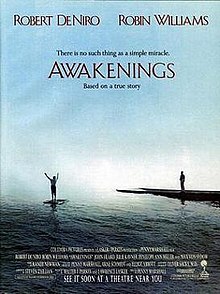 Oliver Sacks’ 1973 memoirs became a drama film with Robin
Williams in 1990. Awakenings, directed
by Penny Marshall, also stars Robert De Niro, John Heard, Julie Knaver,
Penelope Ann Miller and Max Von Sydow. It also has cameos by Dexter Gordon,
Bradley Whitford, Peter Stomare, Vincent Pastore and Vin Diesel. The film
grossed $52 million and was nominated for three Academy Awards, including Best
Picture, but lost to Dances with Wolves.
Oliver Sacks’ 1973 memoirs became a drama film with Robin
Williams in 1990. Awakenings, directed
by Penny Marshall, also stars Robert De Niro, John Heard, Julie Knaver,
Penelope Ann Miller and Max Von Sydow. It also has cameos by Dexter Gordon,
Bradley Whitford, Peter Stomare, Vincent Pastore and Vin Diesel. The film
grossed $52 million and was nominated for three Academy Awards, including Best
Picture, but lost to Dances with Wolves.
In 1969, Malcolm Sayer (Williams) discovers beneficial
effects of the drug L-Dopa on catatonic patients who survived the 1917-1928
epidemic of encephalitis lethargica. After decades of catatonic state, Leonard
Lowe (De Niro) and the rest of the patients deal with a new life in a new time.
Awakenings feels
like a look at what happened after the real Patch Adams actually got his
medical license and there was no need to fabricate a lot of things. But what
makes the film is not just the message, but De Niro’s acting.
The film is one of those that has a message, but is able to
make it without assaulting the viewer. Seeing the pure joy of Lowe standing on
the rock just happy to be able to experience fresh air and be free from his
disease is a very heartwarming scene and it’s difficult to have to watch him
revert back to his catatonic state. Similarly, it makes sense when one of the
patients tells the nurse that she knows it’s not 1926 anymore, but that she
needs it to be. All this to say that we need to really take advantage of the
time we have because at some point, we might have it, but not be able to use it.
De Niro also acts very well in the film, with him being
stiff as a board for the first and final parts of the film. But it’s really in
the reversal back to the catatonia where he really shines, being able to really
express his frustration and anger in body language. Actually, most of the
actors portraying the patients are really able to pull it off very well.
Awakenings seems
to have a similar message as Dead Poets
Society, however, it’s not as blatant as the latter film. It’s a good
movie, especially since it didn’t make a lot of unnecessary changes to the
story of Sacks’ actual work.
No comments:
Post a Comment